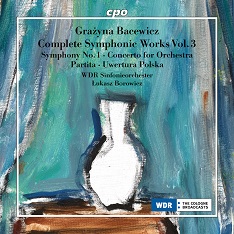Mit diesem Album endet die Einspielung sämtlicher Orchesterwerke der polnischen Komponistin Grazyna Bacewicz mit dem WDR Sinfonieorchester unter Lukasz Borowicz, der zu den interpretierten Werken den ausführlichen und informationsreichen Booklettext selber geschrieben hat.
Das erste Werk des Programms ist die allererste Einspielung der erst vor kurzem veröffentlichten Symphonie Nr. 1, die während des Zweiten Weltkriegs entstand und 1948 uraufgeführt wurde. Einem motorischen und hier kraftvoll brillant interpretierten Allegro moderato folgen ein lyrisches Andante, das mitunter auch etwas aufgewühlter klingt, und ein leichtes verspieltes Scherzo, ehe das pulsierende Finale die Symphonie hoch virtuos beendet.
Die Polnische Ouvertüre von 1954 ist rhythmisch sehr originell und bietet dem Orchester, vor allem im Holz und im Blech Gelegenheit, virtuos zu brillieren, was das WDR-Orchester ganz wunderbar macht.
Mit der 1955 entstandenen Partita für Orchester zeigt sich die Entwicklung von Bacewiczs Musik vom Neoromantischem zu dem in Polen verbreiteten
Sonorismus, der sich in freier, oder besser: befreiter Form auf Klangfarbe Textur, Artikulation, Dynamik und Bewegung konzentrierte, was zur Schaffung von neuartigen und unkonventionellen Texturen führte, wie sie in dieser Partita zu hören sind, die in einer kontrastreichen, spannenden und packenden Interpretation erklingt.
Das Konzert für großes Symphonieorchester entstand 1962 auf Anregung des Dirigenten Witold Rowicki und ist diesem gewidmet. Im ersten Satz fallen Interventionen des Klaviers und des Schlagwerks in einem symphonischen, wie schwebend drängenden und virtuosen Gebilde auf. Das Ohr ist dabei voll beschäftigt, die neuartigen Klänge gierig aufzunehmen. Es folgt ein wie eine fahle, karge Landschaft wirkendes Largo. Das anschließende Vivo wirkt, als sei es das sprudelnde Wasser, das von irgendwo her fließt, um das vorangegangene Largo zu bewässern. Ein virtuoses und klangreiches Finale beendet diese Partita, die beim Hörer ob dieses Reichtums einen tiefen Eindruck hinterlässt.
Das Album endet mit dem modernsten Werk des Programms, In una parte aus dem Jahr 1967. Auch hier faszinieren Bacewiczs schöpferische Kraft und die sonoristische Vielfalt der Musik in einer spannenden Interpretation, die das Engagement von Orchester und Lukasz Borowicz zeigt, diesem Repertoire die Qualität zu geben, die Bacewiczs Orchesterwerke eigentlich populärer werden lassen müsste.
This album completes the recording of the complete orchestral works of Polish composer Grazyna Bacewicz with the WDR Symphony Orchestra under Lukasz Borowicz, who himself wrote the detailed and informative booklet text for the works performed.
The first work on the program is the very first recording of the recently released Symphony No. 1, composed during World War II and premiered in 1948. An energetic Allegro moderato, brilliantly interpreted here, is followed by a lyrical, occasionally more agitated Andante and a light, playful Scherzo, before the pulsating finale brings the symphony to a highly virtuosic close.
The Polish Overture from 1954 is rhythmically very original and gives the orchestra the opportunity to shine with virtuosity, especially in the woodwinds and brass, which the WDR Orchestra does beautifully.
The Partita for Orchestra, composed in 1955, shows the development of Bacewicz’s music from Neo-Romanticism to the sonorism that was widespread in Poland, a sonorism that focused on timbre, texture, articulation, dynamics and movement in a free, or rather liberated, form that led to the creation of new and unconventional textures, as can be heard in this Partita, which is performed in a contrasting, exciting and gripping interpretation.
The Concerto for Large Symphony Orchestra was composed in 1962 at the suggestion of conductor Witold Rowicki and is dedicated to him. In the first movement, the interventions of the piano and percussion are striking in a symphonic, virtuoso structure that has kind of a floating and at the same time urgent character. The ear is fully engaged, greedily absorbing the new sounds. This is followed by a Largo that resembles a pale, barren landscape. The Vivo that follows seems to be the bubbling water that flows from somewhere to irrigate the previous Largo. A virtuosic and sonorously rich finale concludes this partita, whose richness leaves a deep impression on the listener.
The album ends with the most modern work on the program, In una parte from 1967. Here, too, Bacewicz’s creative power and the sonoristic variety of the music fascinate in an exciting interpretation that shows the commitment of the orchestra and Lukasz Borowicz to give this repertoire the quality that should actually make Bacewicz’s orchestral works more popular.


















